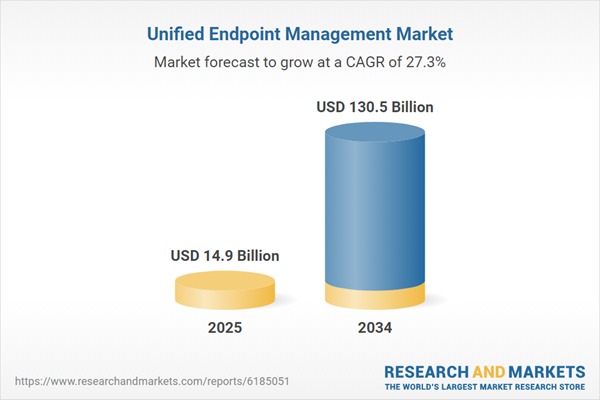The Unified Endpoint Management (UEM) market has experienced robust growth as organizations increasingly seek solutions to manage a growing number of devices within their IT infrastructure. UEM enables businesses to secure, monitor, and manage endpoints such as smartphones, laptops, tablets, desktops, and other IoT devices from a centralized platform. As businesses increasingly rely on mobile devices, remote workforces, and IoT technologies, UEM solutions have become critical for ensuring data security, maintaining compliance, and enabling seamless operations. With the rise of bring-your-own-device (BYOD) policies and the growing adoption of cloud services, the UEM market has evolved to support diverse operating systems and device types, enabling IT teams to have greater visibility and control over their networks. Additionally, UEM solutions integrate security features such as device encryption, threat detection, and remote wipe capabilities, offering businesses enhanced protection against cyber threats. This market is increasingly adopting AI, machine learning, and automation technologies to improve efficiency and reduce manual tasks for IT teams. As a result, UEM has become essential for organizations aiming to streamline operations, enhance productivity, and ensure secure and compliant device usage across the enterprise.
The UEM market is expected to further expand as enterprises continue to embrace the use of multiple devices for work purposes. The increasing adoption of hybrid and remote work models will continue to drive the demand for UEM solutions, as organizations seek centralized platforms to manage a diverse array of devices. Advances in UEM platforms will incorporate more sophisticated artificial intelligence (AI) and machine learning (ML) technologies, allowing for predictive insights and automated management of endpoints. AI will play a key role in threat detection and response, offering real-time identification of security risks and enabling IT teams to take proactive measures. Additionally, as more businesses adopt Internet of Things (IoT) devices, UEM solutions will need to evolve to manage and secure these devices, which present unique challenges for traditional IT management. In response, UEM providers will focus on developing solutions that integrate seamlessly with other IT management tools and platforms, such as Mobile Device Management (MDM), Identity and Access Management (IAM), and enterprise security systems. The growing need for compliance with data protection regulations such as GDPR and CCPA will also continue to push the adoption of UEM solutions, as businesses seek to avoid data breaches and penalties.
The UEM market will continue to see rapid advancements driven by new technologies and the increasing need for IT efficiency and security. The emergence of 5G networks will drive the demand for UEM solutions that can efficiently manage a larger number of connected devices while ensuring high-speed connectivity and security. As businesses scale their operations and expand their device fleets, UEM solutions will evolve to offer more robust management capabilities, including support for edge computing and autonomous devices. Further integration of AI and automation will lead to fully autonomous endpoint management, reducing the burden on IT departments and enabling real-time decision-making. The market will also witness continued focus on providing enhanced user experiences, with intuitive interfaces and seamless integration across multiple devices and platforms. However, the complexity of managing a highly diverse and rapidly growing number of endpoints will present ongoing challenges. Additionally, concerns about data privacy, compliance, and cyberattacks will remain a major challenge for organizations looking to implement UEM solutions at scale. Despite these challenges, the UEM market will continue to grow, driven by businesses’ increasing reliance on secure, efficient, and scalable endpoint management systems.
Key Insights: Unified Endpoint Management Market
- Increased integration of AI and machine learning technologies, allowing for predictive management and real-time threat detection in UEM solutions.
- Growing adoption of IoT devices within enterprises, driving the need for UEM platforms to manage and secure these diverse devices.
- Increased demand for seamless integration of UEM with other IT management tools such as Mobile Device Management (MDM) and Identity and Access Management (IAM).
- Shift towards edge computing and autonomous devices, requiring more robust endpoint management solutions capable of handling complex networks.
- Heightened focus on improving compliance management capabilities within UEM platforms, driven by stricter data privacy regulations such as GDPR and CCPA.
- The rise of hybrid and remote work models, creating a need for centralized, scalable UEM solutions to manage multiple devices.
- Continued adoption of IoT devices in business environments, driving the need for UEM systems capable of securing and managing connected devices.
- Advancements in AI and automation technologies, enabling more efficient, proactive management of devices and IT security threats.
- The growing importance of regulatory compliance, with UEM solutions helping businesses meet data protection standards and avoid penalties.
- Complexity in managing a growing number of diverse devices across an enterprise, as well as ensuring their security and compliance with regulations.
Unified Endpoint Management Market Segmentation
By Component
- Solutions
- Services
By Organization Size
- Large Enterprises
- Small and Medium Enterprises
By Development Model
- Cloud-Based
- On-Premise
By End User
- Banking and Financial Services (BFSI)
- Healthcare
- Retail and Consumer goods
- IT and Telecom
- Government
- Media and Entertainment
- Other End Users
Key Companies Analysed
- VMware, Inc. (Workspace ONE)
- Microsoft Corporation (Intune)
- IBM Corporation (MaaS360)
- Ivanti Inc. (MobileIron)
- Citrix Systems, Inc. (Endpoint Management)
- BlackBerry Limited (UEM)
- Zoho Corporation (ManageEngine)
- Sophos Group plc
- Jamf Holding Corp.
- Broadcom Inc. (Symantec Endpoint Management)
Unified Endpoint Management Market Analytics
The report employs rigorous tools, including Porter’s Five Forces, value chain mapping, and scenario-based modeling, to assess supply-demand dynamics. Cross-sector influences from parent, derived, and substitute markets are evaluated to identify risks and opportunities. Trade and pricing analytics provide an up-to-date view of international flows, including leading exporters, importers, and regional price trends.Macroeconomic indicators, policy frameworks such as carbon pricing and energy security strategies, and evolving consumer behavior are considered in forecasting scenarios. Recent deal flows, partnerships, and technology innovations are incorporated to assess their impact on future market performance.
Unified Endpoint Management Market Competitive Intelligence
The competitive landscape is mapped through proprietary frameworks, profiling leading companies with details on business models, product portfolios, financial performance, and strategic initiatives. Key developments such as mergers & acquisitions, technology collaborations, investment inflows, and regional expansions are analyzed for their competitive impact. The report also identifies emerging players and innovative startups contributing to market disruption.Regional insights highlight the most promising investment destinations, regulatory landscapes, and evolving partnerships across energy and industrial corridors.
Countries Covered
- North America - Unified Endpoint Management market data and outlook to 2034
- United States
- Canada
- Mexico
- Europe - Unified Endpoint Management market data and outlook to 2034
- Germany
- United Kingdom
- France
- Italy
- Spain
- BeNeLux
- Russia
- Sweden
- Asia-Pacific - Unified Endpoint Management market data and outlook to 2034
- China
- Japan
- India
- South Korea
- Australia
- Indonesia
- Malaysia
- Vietnam
- Middle East and Africa - Unified Endpoint Management market data and outlook to 2034
- Saudi Arabia
- South Africa
- Iran
- UAE
- Egypt
- South and Central America - Unified Endpoint Management market data and outlook to 2034
- Brazil
- Argentina
- Chile
- Peru
Research Methodology
This study combines primary inputs from industry experts across the Unified Endpoint Management value chain with secondary data from associations, government publications, trade databases, and company disclosures. Proprietary modeling techniques, including data triangulation, statistical correlation, and scenario planning, are applied to deliver reliable market sizing and forecasting.Key Questions Addressed
- What is the current and forecast market size of the Unified Endpoint Management industry at global, regional, and country levels?
- Which types, applications, and technologies present the highest growth potential?
- How are supply chains adapting to geopolitical and economic shocks?
- What role do policy frameworks, trade flows, and sustainability targets play in shaping demand?
- Who are the leading players, and how are their strategies evolving in the face of global uncertainty?
- Which regional “hotspots” and customer segments will outpace the market, and what go-to-market and partnership models best support entry and expansion?
- Where are the most investable opportunities - across technology roadmaps, sustainability-linked innovation, and M&A - and what is the best segment to invest over the next 3-5 years?
Your Key Takeaways from the Unified Endpoint Management Market Report
- Global Unified Endpoint Management market size and growth projections (CAGR), 2024-2034
- Impact of Russia-Ukraine, Israel-Palestine, and Hamas conflicts on Unified Endpoint Management trade, costs, and supply chains
- Unified Endpoint Management market size, share, and outlook across 5 regions and 27 countries, 2023-2034
- Unified Endpoint Management market size, CAGR, and market share of key products, applications, and end-user verticals, 2023-2034
- Short- and long-term Unified Endpoint Management market trends, drivers, restraints, and opportunities
- Porter’s Five Forces analysis, technological developments, and Unified Endpoint Management supply chain analysis
- Unified Endpoint Management trade analysis, Unified Endpoint Management market price analysis, and Unified Endpoint Management supply/demand dynamics
- Profiles of 5 leading companies - overview, key strategies, financials, and products
- Latest Unified Endpoint Management market news and developments
Additional Support
With the purchase of this report, you will receive:- An updated PDF report and an MS Excel data workbook containing all market tables and figures for easy analysis.
- 7-day post-sale analyst support for clarifications and in-scope supplementary data, ensuring the deliverable aligns precisely with your requirements.
- Complimentary report update to incorporate the latest available data and the impact of recent market developments.
This product will be delivered within 1-3 business days.
Table of Contents
Companies Mentioned
- VMware
- Inc. (Workspace ONE)
- Microsoft Corporation (Intune)
- IBM Corporation (MaaS360)
- Ivanti Inc. (MobileIron)
- Citrix Systems
- Inc. (Endpoint Management)
- BlackBerry Limited (UEM)
- Zoho Corporation (ManageEngine)
- Sophos Group PLC
- Jamf Holding Corp.
- Broadcom Inc. (Symantec Endpoint Management)
Table Information
| Report Attribute | Details |
|---|---|
| No. of Pages | 160 |
| Published | October 2025 |
| Forecast Period | 2025 - 2034 |
| Estimated Market Value ( USD | $ 14.9 Billion |
| Forecasted Market Value ( USD | $ 130.5 Billion |
| Compound Annual Growth Rate | 27.2% |
| Regions Covered | Global |
| No. of Companies Mentioned | 12 |









